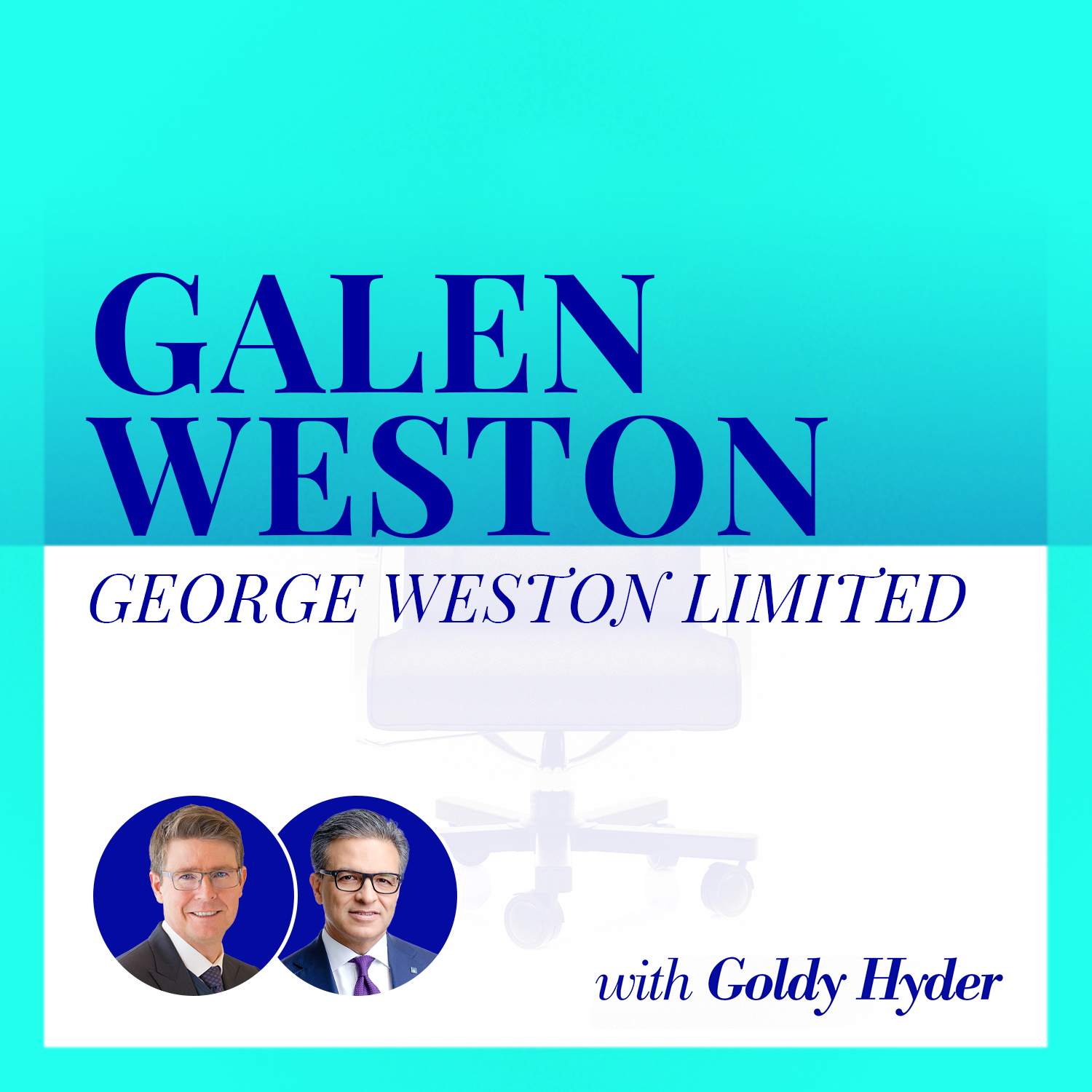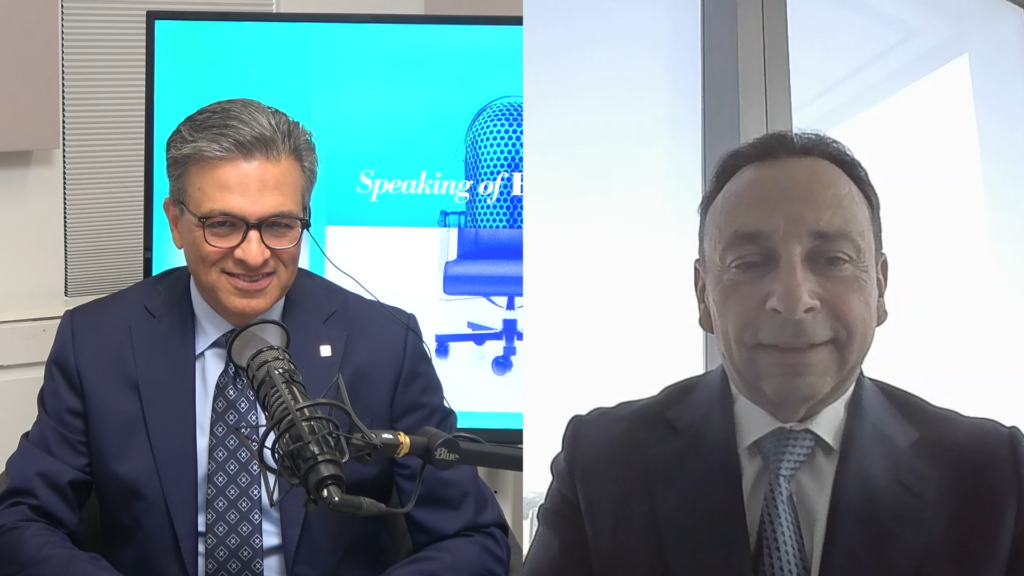As the fourth generation leader of a family business, Galen Weston recognizes the responsibility he shoulders – to his employees, his country, and his great-grandfather’s legacy. Weston’s Real Home-made Bread began in Toronto in 1882. Today, George Weston Limited is one of Canada’s largest private sector companies, with more than 200,000 employees.

“It makes you think in decades, not in quarters,” he says. “You think about what is this company going to be not just a year from now, but 10 years from now, 20 years from now, 30 years from now.”
In a frank and revealing conversation with Goldy Hyder on the Speaking of Business podcast, Weston discusses what he calls “patient capital” – his long-view approach to ensuring the company remains strong and vibrant for generations to come.
It’s a mindset he says Canada needs to adopt as a country, calling on public policymakers to think about how to create long-term prosperity. And he urges business leaders to be part of the discourse. “That unguarded dialogue about what’s in the national interest could pay some meaningful dividends,” he says.
Listen to the full interview, including his reflections on inflation, food prices and the challenges of leadership in the face of public scrutiny, on the Speaking of Business podcast.
Cold open:
One of the biggest challenges I think we face on a national scale and that I worry about is what’s the prosperity narrative for the country? We need to talk more about what it’s going to take for us to be prosperous in five years, in 10 years, in 25 years. Not that the present isn’t critically important. It is. But there has to be an “and,” an “and” about what’s going to drive prosperity for Canadians, in the generations to come.
Goldy Hyder
Welcome to a new season of Speaking of Business, conversations with Canadian innovators, entrepreneurs, and leaders. I’m Goldy Hyder, president and CEO of the Business Council of Canada. In 1882, a Toronto bread salesman and baker’s apprentice named George Weston bought a bread route from his employer. He started baking and selling Weston’s Real Home-made Bread, and by 1884, just two years later, he had bought his old employer’s bakery. The rest, as they say, is history. Investing in innovation and modern equipment, Weston’s bakery grew steadily so that by 1900, it was the biggest in Canada. Throughout the 20th Century, the company diversified well beyond bread.
Today, George Weston Limited is one of Canada’s largest private sector employers with more than 200,000 employees. A leading food and drug retailer, its portfolio also includes financial services and real estate holdings. It is also a 4th generation family business currently run by George Weston’s great grandson, Galen. Today, I’m at Weston Centre in Toronto to speak with Galen about the business, the economy, and Canada’s future generations. Welcome to the podcast, Galen.
Galen Weston
Thanks, Goldy.
Goldy Hyder
Well, look, as I just mentioned, we want to talk about business and the economy. Are you feeling optimistic about the economy right now?
Galen Weston
Well, I’m certainly optimistic when it comes to the inflation story in relation to food. Over the last couple of months, inflation has dropped from around 11 per cent, all the way down to, you know, in our business, in around the 2 per cent range. And that’s a good thing. As far as our customers are concerned, the cost of living is clearly stabilizing in the food industry, and that’s a reason to feel pretty good. But let me say cost of living is still high in this country, and it’s an issue that Canadians are dealing with every day.
Goldy Hyder
Let’s pick up on that because if I’m an average Canadian and I just heard that answer, inflation fell from 11 to 2 or 3. I go, why am I not seeing it when I go shopping, whether it’s for groceries or other things?
Galen Weston
Well hopefully you’re seeing it in certain items, certain products. You know, we are increasingly taking advantage of that reduction in inflation and lowering prices. But the thing to remember is that two per cent inflation is a lot lower than 11, but actually, it means prices are still higher than they were two years ago.
Goldy Hyder
You know, you’ve mentioned inflation and affordability, so I have to ask you what you’ve probably been asked many, many times over the year. And in fact, I’m going to remind you, back when the government decided to call all the CEOs of the grocery chains together and which somewhat unprecedented and probably not consistent with competition. Because you called me, and you caught me, honestly, leaving one of your stores in Ottawa. And I had a list of 5 things my wife wanted me to grab. And I can’t believe, but it hit me when two of those things looked to me … they were blueberries and eggs. It has jumped. And I asked you, are you aware that this is expensive for blueberries and eggs? And you said, yes, I am. Blueberries are costing more. Why?
Galen Weston
Yeah. It’s a great question. And the way to think about it is actually grocery prices across Canada are up about 20 per cent over the last two and a half years. So that’s massive, you know, impact on …
Goldy Hyder
Well their wages didn’t go up 20. Right? That’s what the average person thinks.
Galen Weston
That’s exactly right. So that’s a big increase, and it’s driven by all sorts of things, particularly supply chain challenges. As the cost of fuel goes up, the cost of transporting food goes up. Labour, as we came out of a period of great labour shortage coming out of COVID, that increased the cost of producing product, harvesting, you know, blueberries from a farm, you know, more expensive than it was just a couple of years ago. Just about every aspect of the value chain has been negatively impacted over the last couple of years. Climate change is another. Most of the major growing regions in North America have been impacted in some negative way, you know, by climate change. And that just means, that there’s less product to go around and to access it, the prices actually go up.
Goldy Hyder
So it’s a supply and demand story.
Galen Weston
It is a supply demand story. That’s right.
Goldy Hyder
But a perfect storm, all these elements that you’re saying converging at the same time.
Galen Weston
Yeah. Very difficult perfect storm. And when you’re at the end of the value chain like we are as a grocer, navigating that storm, you know, has been exceedingly difficult.
Goldy Hyder
Yeah. One of the things I know about CEOs in general is how much they care about culture and how much they care about their employee base. I mentioned off the top, 200,000 is crazy big number. And yet, you’re under so much public and political scrutiny. I’m wondering how that attention and what is usually negative attention. They don’t report safe landings. They only report crashes. How are you carrying that burden and responsibility of being the head of something that employs not 200,000. That’s the right number. But you and I both know there’s a multiple to that. On average, it’s two and a half to three. So you’re responsible for feeding 600,000 people who happen to be 200,000 of whom are your employees. How are you dealing with that?
Galen Weston
Look. I face a lot of public scrutiny. You know, as a CEO, a lot of us do. And certainly, that’s been the case for grocers over the last 18 months to two years. You know, that’s a little bit part of my job. It is far worse for the colleagues who work in our stores who are at the point, particularly cashiers.
Goldy Hyder
They’re on the front lines. Right?
Galen Weston
They’re on the front lines of a store, and they face extraordinarily difficult forms of criticism, as if they are responsible, you know, as individuals for the high food prices. So that’s something that we take really seriously. And we try and make sure that they have the right information, that they can feel proud of the choices that the company that they work for is making, that we are not profiteering, that we are not responsible for, you know, what they call greedflation.
Goldy Hyder
And how are they doing? I mean, how do you really think your employees are doing right now?
Galen Weston
In respect to the criticism that they face for working in grocery stores, I think they’re extremely resilient and feeling pressure, but also feeling a great deal of pride with the organization that they work for. Colleague engagement scores, which is one of the ways that we measure this, are stable to improving. But it’s a difficult time.
Goldy Hyder
Well, it’s also a difficult time to be a CEO. And, of course, I’m representing 170 plus CEOs of this country, and we’ve had this conversation. What’s happened out there that CEOs have somehow become this punching bag? And yet, they’re the job creators, they’re the wealth creators, they’re the ones who create the capacity for people to pay taxes and so forth. Has there been a fundamental shift in being a CEO now than it was maybe 20 years ago?
Galen Weston
It’s a great question. And you and I have talked about this quite a bit over the years. I think that things have changed in a material way. I think there is a tendency today that didn’t exist 20 years ago to villainize profit as an inherently negative thing. That the more successful or profitable a corporation is, the more it must be exploiting either its employees or its consumers, or perhaps even the environment. And these are all real challenges.
Goldy Hyder
Wouldn’t that all be bad for business if you were doing that?
Galen Weston
It’s a great point. We don’t operate that way as CEOs. In fact, I would say, you know, I’ve been at the top level in Canada for, you know, nearly 20 years. And I would say today, the leaders of Canada’s largest corporations are more nationally minded, more overall prosperity-minded than any group of CEOs who have come before them. It’s a pretty inspiring thing when you sit in the rooms that you and I do and we listen to what the aspirations and ambitions of those leaders actually are.
Goldy Hyder
Building off that, you know, you mentioned populism to some extent. You didn’t use that word. I’m using the word, but everybody’s now a workers’ party. Everybody’s now a small business, SME party. How can business educate, reorient itself with the public? Because no one’s going to do it on behalf of you. How do we go about how do you go about as the largest employer that you are to help the communities in which you work and operate realize the role of a business?
Galen Weston
We have to do a better job of telling our own stories. And you touch on it extremely importantly. It’s our employees first. We have to empower them with knowledge about the purpose, the mission, and the facts, you know, of how we’re conducting business. That’ll make a very, very big difference. As you say, in my case, over 200,000 people work in the company. If they are advocates of the jobs that are being created, of the prices that are the innovation that’s coming through the organization, they share it with their families. We can touch a very significant number of Canadians and help them think more positively about the role that private sector plays in creating the prosperity of the country, which is what it does.
Goldy Hyder
In that backdrop of what we’ve just discussed, you put your face out there. You became the poster child for your own company. I suspect that was something that was much discussed and debated and yet you chose to do it. Any regrets?
Galen Weston
Well, look. I did it for 10 years. And I said to myself, I’m going to step down when my children enter grade school because I didn’t want them to be the kids at school who had the dad on TV, and it was extremely successful.
Goldy Hyder
Been there, done that. My kids said, let us change our last name if you do any more than this.
Galen Weston
Yeah. That’s right. So I kinda came off TV four or five years ago, very intentionally after a great run of success for the company and for the reputation of the brand. I came back to it a couple of years ago because I felt there was more to say and a more important story to tell about the company and about the good things that were going on in our industry. And I think in an effort to tell those stories at a time where consumers were most anxious and frustrated, it kind of boomeranged back in a way. People didn’t want a CEO from a very successful family, talking about the challenges that they’re facing with food prices every week. It didn’t resonate. And, you know, I think in that respect, we probably made the wrong choice.
Goldy Hyder
But is that I mean, I’ll push back and say no, maybe that was the indication of leadership with courage. You tried to do the right thing.
Galen Weston
Well, certainly, that was the idea. You know, but you do have to listen carefully to how people react to what you’re saying. And in this case, for whatever reason, it didn’t sit well. And, you know, that’s unfortunate because I think as a consequence, the inherent positive action was clouded a little bit by the voice that delivered it.
Goldy Hyder
These days, it’s hard to get a message out in any event. Right? I mean, people debate whether it’s sunny outside right now. And by the way, it’s bright and sunny outside.
Galen Weston
Yeah. It’s absolutely true. It’s more difficult to communicate the facts of any story. And if you’re a businessperson, you know, you make decisions based on facts. You do things based on evidence because you’re depending on a predictable result. And when you are in the communications world, so much of communications today …
Goldy Hyder
EQ
Galen Weston
… is about EQ. It’s about emotions. It’s very hard to argue emotion with fact. And as companies, we have to get better at communicating in the language of our audience as opposed to in the language of business.
Goldy Hyder
There’s that great saying, right, your facts don’t change the way I feel.
Galen Weston
Right.
Goldy Hyder
And there’s a lot of that going on right now. I mean, you look at the economy in the U.S., it’s booming. But everybody I surveyed in my Uber drive said, oh, it’s horrible. Even you probably have something that keeps you up at night as a result. What’s keeping you up these days?
Galen Weston
Well, look, one of the biggest challenges I think we face on a national scale and that I worry about and think a lot about is what’s the prosperity narrative for the country? We need to talk more about what it’s going to take for us to be prosperous in five years, in 10 years, in 25 years. Not that the present isn’t critically important. It is. But there has to be an “and,” an “and” about what’s going drive prosperity for Canadians, in the generations to come.
Goldy Hyder
Well, you could do something about that. Right? You personally can do more.
Galen Weston
Absolutely. Look, I’m in a position of enormous privilege with resources with a voice and with access to very, very bright smart people. And, you know, I think what we need to have is we need to have more constructive dialogue with the private sector so that our ideas are heard and understood in the way that they’re intended, which is as part of the prosperity dialogue. Too often, people listen to business leaders and think that’s about them making more profit. And it’s not. First of all, making profit and growing is not inherently a bad thing. Secondly, we have an accountability beyond our shareholders to all our stakeholders in our businesses. That’s what makes us successful. And so these things matter. Social trends, demographic trends, environmental trends, they are all important to our prosperity and the country’s prosperity.
Goldy Hyder
I’ve long believed doing good is good business.
Galen Weston
Yeah. Well said.
Goldy Hyder
Speaking of business, I suppose you had a choice, right, whether to get into this one or not. What made you join the family business? Is this just what you were expected to do or it’s what you wanted to do?
Galen Weston
It was something that I was fortunate enough to always be interested in. I always liked it. You know, when I was six years old, my father would take my sister and I out to a supermarket where he was talking with and meeting with store managers and colleagues in the stores. So I grew up kind of in that world. We’d talk about the latest President’s Choice product at dinner as a family. So it’s kind of injected into my veins at the earliest age, Not as a, you have to run a business one day, son, but more as a, hey, this is what we do. And this is interesting and it’s fun and cool. So, you know, as I grew up the opportunity was there. And I started to actively engage in it. And it was really probably took 10 years for me to advance from where I started to the top of the organization. You feel a great sense of family pressure. You want to be successful. You want to deliver on a family legacy in a really positive way. But, ultimately, it was a love for groceries, for supermarkets more than anything else that got me there.
Goldy Hyder
Yeah. And in your case, this was, long established, as I said in the introduction a business. You know, I you may recall I come from family business as well. And the whole the boardroom’s a family dinner table every day. You know, you came in. The business is growing. But it is a family business and it makes it different than some of the other companies. And I want you to explain to the listeners, and many of whom are young entrepreneurial MBAs in the making and all of the others. What’s different about a family business?
Galen Weston
Well, in our case, we’re four generations. That’s a lot of family members. And it makes you think in decades, not in quarters. You think about what is this company going to be, not just a year from now, but 10 years from now, 20 years from now, 30 years from now. The way we make decisions is a bit different. I call it patient capital. I’m not so concerned about beating the benchmark every quarter. I’m concerned about will the decisions we make create value, strength, and durability, endurance? You know, I want this company to endure for many generations to come, and I have to make decisions with those outcomes in mind as well. It’s a real privilege, you know, to be able to do that. And, you know, we make our best decisions. I think that’s different to a lot of public companies today that make their most important decision based on the short term.
Goldy Hyder
Yeah. This is part of the blowback you get from the political arena when businesses go in there and say, you know, you’re making it difficult for me to think about the long term. And they’re like, well, that’s really rich. You you’re quarterly oriented. We’re electorally cycle oriented, both of which are short term in the big picture. Isn’t that part of the problem is no one is thinking about the long term? You know, you talk about a prosperity narrative. You mentioned endurance. These elements are not in play in our political discourse today.
Galen Weston
It’s hard to see it in the politics of today. Certainly, it feels very much short term, feels very much what’s the issue of the latest poll as opposed to what will drive success or prosperity for the country. We need to change that dialogue. I do think that this is a place where business leaders, especially those with long term outlooks, family businesses play a role. Not all CEOs are short term in their outlook too. That unguarded dialogue about what’s in the national interest could pay some meaningful dividends.
Goldy Hyder
So tell me a little bit more about the patient capital philosophy and certainly the pedigree of your family and some of the lessons that you were taught about that.
Galen Weston
First of all, my grandfather had a saying which was, “when you do the right thing, you may not win every time, but you will win over time.” It’s a mantra that’s really important for me when I’m making difficult decisions, that even if there’s a short-term negative consequence, if it’s the right decision, ultimately, it will pay off at the end of the day in some way, financially or in terms of just the pure durability of the enterprise. Let me give you an example of environmental change. Okay? We feed a good portion of the nation every week. And so if there is drought in California or if there is drought, in Saskatchewan that is impacting the source of supply, that is a major business issue for us, and it is a major food security issue for Canadians. And so for us to be thinking proactively about sources of supply, about the integrity of availability of water and irrigation, these things are business decisions for us that we want Saskatchewan to produce wheat in Canada for 40 years, and a drought will make that very difficult. And so we think about how do we take action to reduce the risk of food production in this country.
Goldy Hyder
In terms of the impact on long term, right, the long-term views of things, how have you been able to approach your corporate culture and your talent and the retention of your talent because you take that long view?
Galen Weston
When you’re in a family business, tenure and loyalty matter because you want other people in your company to be thinking about the long term, not just yourself. And if somebody sees their career with Loblaw or with George Weston as a career that’s 30 years, they will think differently to if they see their career as three or four years or a stepping stone, you know, to something else. So that’s really important.
Goldy Hyder
And you have people with that Canada of longevity in the company that are not sitting in the C-suite?
Galen Weston
I recognized somebody just, last week who was celebrating their 50th year in the company, which is a great joy for me to do. I probably once or twice a year, I make a 50 year service call, which is which is great fun.
Goldy Hyder
Not that you’re thinking about succession, but every CEO’s job is to think about succession, succession planning. Are you preparing the next generation of Westons to lead?
Galen Weston
I would never do that. You know, I think a sense of obligation, for a family member to work in a business is not a tremendous recipe for success. So I’ll try and follow my own father’s path, which is
Goldy Hyder
Take them to the grocery store in a cart?
Galen Weston
Exposure. Exposure, you know, and to show them some of the exciting and interesting things. You know, we have a new, very large robotic warehouse that’s under construction right now just north of the city. I’m going to bring my kids to see that, so they can see all of the mechanical robots in action in a couple of months, just to light a fire under them, to help them see how dynamic and interesting it is, what we do.
Goldy Hyder
You read my mind on my next trail of thoughts here, which was you said robotics, for example. I was thinking more broadly like, how do you see technology, particularly artificial intelligence, and, yes, robotics, impacting not just your business, but let’s talk about the customer experience of your business.
Galen Weston
It will be, I’m going to say, very significant. At this point today, we don’t see artificial intelligence as profoundly transforming our business model. And let me explain why. Because, we sell product that comes out of the ground. It’s a physical thing. A potato comes out of the ground. We have to make sure it gets picked, packed, and shipped, so that it can be available for you or anybody else to buy. Robots can make that process more productive. Artificial intelligence can make it more accurate. But ultimately, we’re not going to replace that potato, not in my lifetime anyway, with a line of code.
Goldy Hyder
You know, we were talking about patient capital. And, you mentioned the, do good and the good things will happen even if you have to make tough decisions for the long run. One of the quotes I read from you that I want to talk about not so much in the context of the business, but in the context of Canada as we pivot to the next theme is you said, in baseball terms, my family would rather hit a safe single than swing for the fence and risk striking out. Is that part of Canada’s problem?
Galen Weston
From my perspective, it’s, not a problem. And it’s a nuanced concept. When you’re thinking about prosperity over the course of decades, taking a swing that leads to the end of your enterprise doesn’t make sense. And just adding a base hit to a base hit to a base hit over 30 years is going to create more durability, more tenure, and more prosperity for the company. I think that same concept can apply to the country as a whole. But it can’t be, to use your words, it’s got to be singles. The country has to hit singles intentionally and continue to advance around the bases. It can’t be foul ball after foul ball after foul ball.
Goldy Hyder
You’re not out, but you’re also not going to be scoring any runs.
Galen Weston
That’s right. And then, look, I have to say, when the right opportunity comes along, then you do need to swing for the fences. Certainly it’s my philosophy. When you have real confidence and you have the wind at your back, those are the times where you put more chips on the table. I would never advise putting all the chips on the table, but certainly, you’re going to make bigger bets when the circumstances are there.
Goldy Hyder
Well, even on a baseball team, not everybody swings for the fences of the nine who are batting. Right? People are equipped to hit singles. But if you’re the one who’s supposed to hit the home run, you should swing for the fence. Right?
Galen Weston
If you have the right pitch.
Goldy Hyder
Well, how do we get that? I guess that’s part of the thing. We just discussed everyone is thinking short term. Businesses, in many cases not yours, but are you know, there’s a risk in speaking out. There’s left wing and right wing populism, the erosion of our media. What are we going to do to get a handle on this because of what you said about Canada’s prosperity? This is not about you and me or the CEOs. This is about the kids and grandkids.
Galen Weston
Well, let me give you an example just to further the discussion. Climate change, one of the biggest challenges facing the world. Canada has a responsibility to play its part in reducing the risk and the impact of climate change. We’re an energy rich, resource rich country, and our economy is dependent on prosperity in the energy sector. And we have to balance those two important interests. So as you know and many others know, Western Canada has one of the most attractive geologies for carbon sequestration. And we have some of the most advanced engineering thinking in the energy sector in the world. And if you were to combine those two things and rather than constantly try and prevent anything more from happening in the energy sector, why don’t we lean into, for example, something like carbon capture and swing for the fences to be the greatest carbon capture nation in the world. Because that’s what I call a good pitch.
Goldy Hyder
Yeah. No kidding.
Galen Weston
So let’s try and swing for that. It’s not without risk. Carbon capture is not yet an economically proven technology.
Goldy Hyder
It’s a high moving fast ball.
Galen Weston
Yeah. But don’t you think that’s the kind of thing? So we have to be selective about the places that we want to swing for the fences.
Goldy Hyder
You said it earlier, and I’ve been saying it a lot as well. But somehow we got to a narrative of “or” and not “and.” How do we get back to that? I mean, this is great what you said. You know, I didn’t come here expecting the CEO of a grocery to lean in on an issue that I confess is very important to me as an Albertan, and it’s very important to me as a Canadian. For the reasons you cite, the opportunities are so there for us. But we’re not having that conversation.
Galen Weston
It’s a great frustration to me. So what can we do more of, you know, I think we have to be as business leaders, we have to be active advocates. As political leaders, we have to back away from this suspicion that the private sector is to be villainized or that the private sector is to be resisted. We have great minds in industry who are excited and enthusiastic about collaborating with government to generate the best outcomes for the country. It can’t be done, in an effective way if it’s all “or” and there’s no “and.”
Goldy Hyder
You’re clearly a successful businessman, but also a successful leader. And so as time flew by here, I want to just quickly ask you about leadership more broadly. Two things. First of all, who taught you? Who had the biggest impact on you to be the leader that you are? And then secondly, what advice would you give emerging leaders who are listening to this podcast that say, you know what? I want to run a company one day, or I want to run a sports team one day, or I just want to run … you know university … or whatever the case might be. What advice would you give them?
Galen Weston
Well, I was extremely fortunate. Growing up in a family business of some size and scale I was exposed not just to my father, who was an extraordinary leader, a people person in a profound and exciting way. But also I had exposure from a very young age to other leaders in the organization who were different but equally successful, you know, in their own way. So I had mentors and examples to draw from that I think were probably foundational in establishing my own leadership style. I was educated to think in a conceptual way. You know, that’s also very, very important. Having an organized mind so that you can break down complex problems into actionable pieces. Probably, I would say, one of my bigger strengths as a leader. Not everybody has to have that skill, but it’s a great one to hone and to develop, especially if you want to lead a company and a big one at that. What’s my advice? Commit to your education, for sure. Look for the right mentors who you can take inspiration from. And most importantly, most importantly, I’ve learned over time is you have to listen. And we’re less and less patient, you know, as generations go on. It’s my observation of …
Goldy Hyder
Why are we doing my performance review right now? I don’t need this.
Galen Weston
You know, certainly feels like my kids have a shorter attention span than I did, and I know my attention span was shorter than my parents’ but the skill of listening, listening to learn, listening to understand what someone across the table is saying to you. This is how you get better. This is how you get richer in the way that you think about things. And that takes more time than rushing to the answer. So if you’re young and you’re impatient and you’re ambitious my counsel to you would be, make sure that you’re intentional about listening and taking your time when you’re around people who, have a lot of experience.
Goldy Hyder
Alright. Well, this has been fun, but I have more fun before we wrap up. Just some rapid fire questions for you and I to have some fun with. And some of these, there’s only one way to answer to, Galen, so think carefully before you answer. Alright?
Galen Weston
Alright. Alright.
Goldy Hyder
Especially this one, which is my own personal favorite. But what is your favorite President’s Choice product? There’s only one right answer.
Galen Weston
Mine is it’s going to have to be the President’s Choice frozen croissant.
Goldy Hyder
No. Wrong answer. It’s the chocolate chip cookies. Everybody knows that.
Galen Weston
That’s true.
Goldy Hyder
Everybody knows that. But, anyways, that could be a good runner-up. Favorite food?
Galen Weston
So spaghetti bolognese. So a spaghetti with meat sauce for me, I’d have my last meal. And so it’s the ultimate comfort … it’s the ultimate comfort food.
Goldy Hyder
Keep it simple. Actually, there’s there’s something about that keep it simple with you. I’ve always seen that that’s what you try and do. Favorite part of Canada?
Galen Weston
Favorite part for me is Georgian Bay right here in Ontario. It’s a place where we spent a lot of time growing up. Absolutely beautiful.
Goldy Hyder
So outside of Georgian Bay, what do you do to relax?
Galen Weston
So I like to read science fiction. And science fiction takes you out of the constraints and challenges and issues of today because you’re in some other future or you’re on some other planet. So I find that, you know, a really interesting …
Goldy Hyder
The creative imagination comes out.
Galen Weston
And the creative imagination comes out.
Goldy Hyder
So you’re reading, which is a good thing. What one book do you think Canadians should actually read right now?
Galen Weston
So I’m halfway through a book from a medical doctor by the name of Peter Attia. It’s called Outlive. And it’s really about how much more control we have about the health outcomes we experience late in life. And it’s something every Canadian, I think, should read because we can do so much better with our own choices when it comes to our personal health and the health of the nation.
Goldy Hyder
Favorite music?
Galen Weston
I’ve been a Beatles fan since I was about 7 years old.
Goldy Hyder
There’s nothing wrong about being a Beatles fan. That was an easy one. It made up for your other mistake, but cookies are definitely the right answer.
Galen Weston
Chocolate chip cookies. Chocolate chip cookies.
Goldy Hyder
Sport.
Galen Weston
Mountain biking I really enjoy for personal exercise. To watch, it’s probably tennis.
Goldy Hyder
And do you go in person to watch?
Galen Weston
I have been in person to watch.
Goldy Hyder
You have a memory from a favorite tennis match?
Galen Weston
I watched the finals of Wimbledon when I was, I’m going to say, nine years old between John McEnroe and Jimmy Connors.
Goldy Hyder
Oh, classic.
Galen Weston
I was for McEnroe, and he lost. And I remember …
Goldy Hyder
But he entertained. Let’s be clear.
Galen Weston
Yeah. He entertained. Yeah. 1984, I think.
Goldy Hyder
Well, look, Galen, I can’t thank you enough for doing this. I’ve known you on and off for the last 20 some odd years, but certainly a lot in the last 5 years. And one thing that jumps out at me is, how relaxed you can be. Even in the most stressful environment, you’re very together. And I think what you’ve shown people on this podcast today is how you are that way. And I want to thank you for it. And I want to thank you for being a leader at a difficult time wanting to make Canada better than it currently is.
Galen Weston
Thanks, Goldy. A pleasure.
Goldy Hyder
Galen Weston is the chairman and Chief Executive Officer of George Weston Limited.
This is the first podcast of our new season.
Incredibly, we are about to mark our one hundredth episode of Speaking of Business.
We have a rich archive of thoughtful conversations with some of Canada’s most influential business leaders, and I encourage you to explore more of them and subscribe so you don’t miss any.
Search for Speaking of Business wherever you get your podcasts. You can also listen to them on our website at the business council dot c-a.
Until next time, I’m Goldy Hyder. Thanks for joining us.









